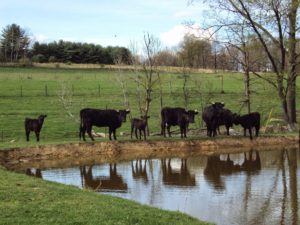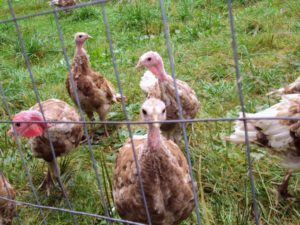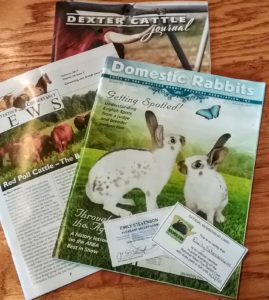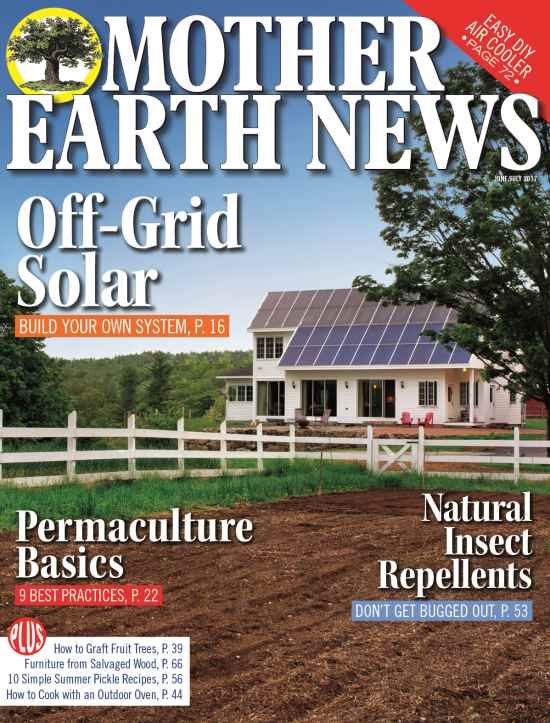Here at Pleasant Valley Farm, we raise a number of heritage breeds and try to be active in helping to conserve them as well. We like Dexter cattle because they are great homestead cows, produce a nice beef carcass, calve easily and are great mothers, are hardy, easy keepers, give a nice amount of milk for a family if we choose to keep a milk cow, and they can even be trained as oxen. Our Bourbon Red turkeys breed naturally so we can hatch poults, provide an even ratio of white to dark meat, forage well, and are just beautiful birds. I’ve had Delaware roosters tenacious enough to take on a raccoon trying to harm the laying hens after dark, but gentle enough I never worried about turning my back on them. Silver Fox rabbits with great mothering instinct, beautiful pelts, good meat production, easygoing temperament, and winter hardiness. Our Toulouse geese hatch their own young, protect them from predators, and need fed only in the dead of winter as they forage 100% of their diet nearly year round. For every heritage breed here at the farm, there are a list of reasons why they are a great fit for us. (For more information on heritage breeds, check out my post Heritage Breeds- What They Are, Why They Matter).

We find our Dexter cattle to be a perfect fit for our farm.
Conserving means breeding the best examples and culling the rest. Although many of these breeds are rare, it’s important to increase the number of breeding animals only when they are excellent example of the traits that make a breed unique. Paying attention to temperament, health and confirmation as well as overall production traits are the essentials of helping to conserve what makes these breeds wonderful. The problem with industrial breeds is that they have become too narrowly focused on production at the expense of other positive traits. We raise Dexter cattle registered with the Purebred Dexter Cattle Association. We only put papers on the best examples of the ones born here. Any that are not are the ones we offer to our customers as grass-fed beef. We’ve been able to make a modest profit on our heritage breed product while growing a small but high-quality herd for the future.
Breeding your own means also being able to focus on the qualities most important to you. For instance, we have thirteen species of livestock & poultry, and maintain a breeding population for nine currently. That means in an average day, we deal with a bull, a boar hog, a ram, roosters, gobblers and more. Some, like the bull, are considered a hazardous occupation by many government regulations. We refuse to keep a dangerous animal. While we need a bull, we require we able to walk through our pasture and barnyard without fear. Industrial agriculture relies on artificial insemination, so the bull’s temperament is often overlooked. For small farms, it is a necessity. Even by culling roosters that were aggressive, we have fewer that show those tendencies in subsequent generations. The traits you select for or ignore matter.

Not all of these young Bourbon Red turkeys will end up in our breeding flock. It’s important to select only the best examples of the breed.
Many small breeds have clubs or registries. I find it worthwhile to support these nonprofits dedicated to conservation and promotion of the breeds I love. These memberships usually come with monthly, bimonthly or quarterly publications. It’s a great way to learn about what other small producers are doing successfully, how to market our heritage breed products, improve our husbandry, and keep focused on the traits that make that particular breed great. The Livestock Conservancy is a non-profit dedicated to monitoring and helping to preserve heritage breeds and is a great general resource. They keep track of breeds of horses, asses, cows, sheep, goats, pigs, rabbits, geese, turkeys, chickens, ducks and provide resources for learning about them, networking, education and more. Other organizations, like the American Rabbit Breeders Association, focus on one species but many breeds, not all heritage. Larger organizations like this may be valuable for shows to have an outside source judge your stock, or provide valuable networking and registration opportunities. Breed-specific clubs and registries, like the Purebred Dexter Cattle Association or the National Silver Fox Rabbit Club, focus on one breed. They are valuable for registering your stock, often organize events and conferences, and promote the breed. Most often all of these organizations have classifieds as well, sometimes even free online for members, that can be a valuable way to sell or buy breeding stock.

Publications from livestock associations help me to keep learning more about the breeds I love!
I find great fulfillment in helping to steward these rare breeds. While I can’t do much to save the polar bears or the elephants or the other big poster-species for endangered animals, this I can do. Although the Giant Panda has just 2,500 individuals remaining in the wild, there are 80 breeds of livestock and poultry worldwide with fewer numbers and in greater danger of extinction*. At our farm, the Silver Fox rabbits fall into this unfortunate category, and others are, while more numerous, still in real danger .
I can remember the excitement of traveling to a farm to purchase breeding stock of an animal I’d dreamed about raising. It’s a privilege to be on the other side now, providing the seeds of a flock, rabbitry, or other small-farm dream to others looking to enter the world of heritage breeds. By choosing these breeds, I can find animals ideally suited for my farm and methods. I breed my own stock for meat or eggs to offer for sale or to add to the breeding population here. I also have excess stock to sell and, best of all, it enables me to be a small part of helping to ensure they survive for future generations of farmers to raise.
* Statistics taken from The Livestock Conservancy website, a non-profit organization.










